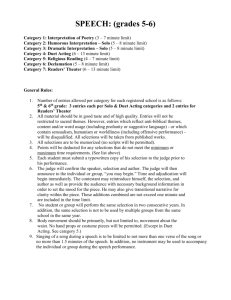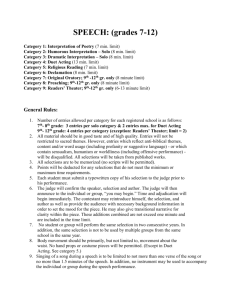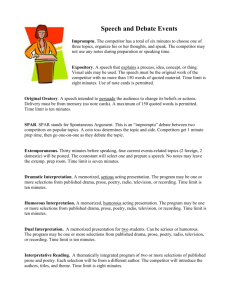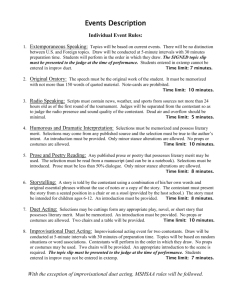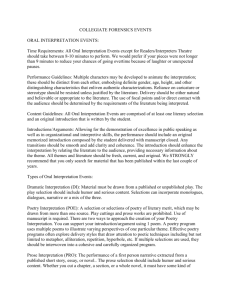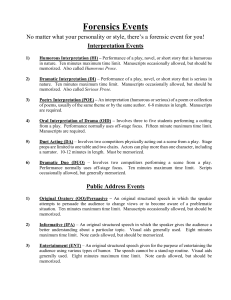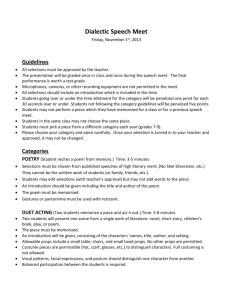SPEECH: (grades 9-12)
advertisement
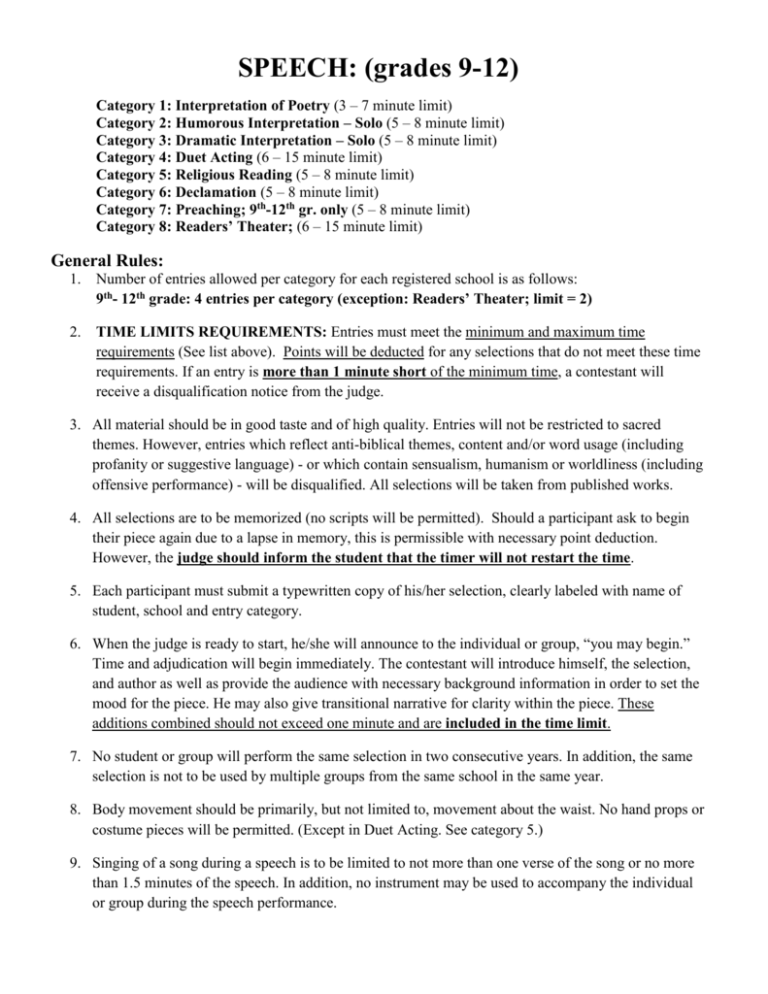
SPEECH: (grades 9-12) Category 1: Interpretation of Poetry (3 – 7 minute limit) Category 2: Humorous Interpretation – Solo (5 – 8 minute limit) Category 3: Dramatic Interpretation – Solo (5 – 8 minute limit) Category 4: Duet Acting (6 – 15 minute limit) Category 5: Religious Reading (5 – 8 minute limit) Category 6: Declamation (5 – 8 minute limit) Category 7: Preaching; 9th-12th gr. only (5 – 8 minute limit) Category 8: Readers’ Theater; (6 – 15 minute limit) General Rules: 1. Number of entries allowed per category for each registered school is as follows: 9th- 12th grade: 4 entries per category (exception: Readers’ Theater; limit = 2) 2. TIME LIMITS REQUIREMENTS: Entries must meet the minimum and maximum time requirements (See list above). Points will be deducted for any selections that do not meet these time requirements. If an entry is more than 1 minute short of the minimum time, a contestant will receive a disqualification notice from the judge. 3. All material should be in good taste and of high quality. Entries will not be restricted to sacred themes. However, entries which reflect anti-biblical themes, content and/or word usage (including profanity or suggestive language) - or which contain sensualism, humanism or worldliness (including offensive performance) - will be disqualified. All selections will be taken from published works. 4. All selections are to be memorized (no scripts will be permitted). Should a participant ask to begin their piece again due to a lapse in memory, this is permissible with necessary point deduction. However, the judge should inform the student that the timer will not restart the time. 5. Each participant must submit a typewritten copy of his/her selection, clearly labeled with name of student, school and entry category. 6. When the judge is ready to start, he/she will announce to the individual or group, “you may begin.” Time and adjudication will begin immediately. The contestant will introduce himself, the selection, and author as well as provide the audience with necessary background information in order to set the mood for the piece. He may also give transitional narrative for clarity within the piece. These additions combined should not exceed one minute and are included in the time limit. 7. No student or group will perform the same selection in two consecutive years. In addition, the same selection is not to be used by multiple groups from the same school in the same year. 8. Body movement should be primarily, but not limited to, movement about the waist. No hand props or costume pieces will be permitted. (Except in Duet Acting. See category 5.) 9. Singing of a song during a speech is to be limited to not more than one verse of the song or no more than 1.5 minutes of the speech. In addition, no instrument may be used to accompany the individual or group during the speech performance. Rules for each Category: Category 1: Interpretation of Poetry (time limits = 4 min. – 7 max.) Definition: The memorized oral interpretation of poetry by an individual. Selections from the Bible are not appropriate and should be entered in Religious Reading, category 6. Category 2: Humorous Interpretation (time limits = 5 min. – 8 max.) Definition: The memorized oral interpretation of a humorous selection by an individual. Cuttings may be taken from published plays or any appropriate humorous, dramatic or narrative literature and may incorporate multiple characters. Category 3: Dramatic Interpretation (time limits = 5 min. – 8 max.) Definition: The memorized oral interpretation by an individual of a serious selection from a published play. Cuttings may incorporate multiple characters, but monologues are also acceptable. Religious readings are not appropriate and should be entered in Religious Reading, category 5. Category 4: Duet Acting (time limits = 6 min. – 15 max.) Definition: A stage performance in which two individuals each portray one character without the use of script, costumes, staging, lights, sound effects, or make-up. Cuttings must be taken from published dramatic literature or from prose that has been scripted for stage. Duet acting will develop an understandable scene with clear character relationships, character movement, and character action and reaction. The scene(s) should grow through increased insight, intensifying of plot or mood, and thematic statement. Characters may speak to silent or off-stage characters. Actors may make use of small hand props and costume accessories (such as an umbrella, shawl, gloves, hat, glasses, etc.). No make-up lighting, full costumes or furniture other than a table and two chairs may be used. Category 5: Religious Reading (time limits = 5 min. – 8 max.) Definition: The memorized oral interpretation of prose or poetry by an individual. The selection should inspire or convict spiritually. The presentation should include dialogue and be dramatic in nature. Selections from the Bible are appropriate. Category 6: Declamation (time limits = 5 min. – 8 max.) Definition: The memorization of a speech given by a previous orator. The speech must be a published work. The presentation may be edited to fit time constraints. Previous winners in Original Oratory at national competitions (such as NFL, NCFL, etc.) may qualify as declamations, but must conform to the general rules for the tournament. Category 7: Preaching (9th-12th gr. only) (time limits = 5 min. – 8 max.) Definition: The presentation of a memorized original speech on Biblical & moral topics. May include expository, topical or evangelistic presentation, but must conform to the general rules of the tournament. Category 8: Readers’ Theater (time limits = 8 min. – 15 max.) Definition: The oral presentation of dramatic, poetic or prose material by a group focused on the audience, utilizing some or all of the following techniques: dramatic “V”, out of scene and characterization. The presentation may include these types: cameo (face only movement), upper body or whole body movement. Characters are not to interact with each other as they do in duet acting. Specific Rules (Readers’ Theater): 1. Group size consists of 4 to 8 individuals 2. Minimal use of small hand props and costume accessories (such as an umbrella, shawl, gloves, hat, glasses, etc.) by the readers is allowed. 3. No makeup, lighting, full costumes or furniture other than a table, chairs and stools. 4. All members dressed in black (or any color) or in the same style shall not be considered to be wearing costumes. 5. The presentation will be judged on originality of arrangement and the skillful use of the techniques to move the audience with the chosen material. Memorization is required. 6. Any form of literature, poetry or prose adapted to the Readers’ Theater for will be appropriate for this contest. All literature must meet acceptable guidelines.
